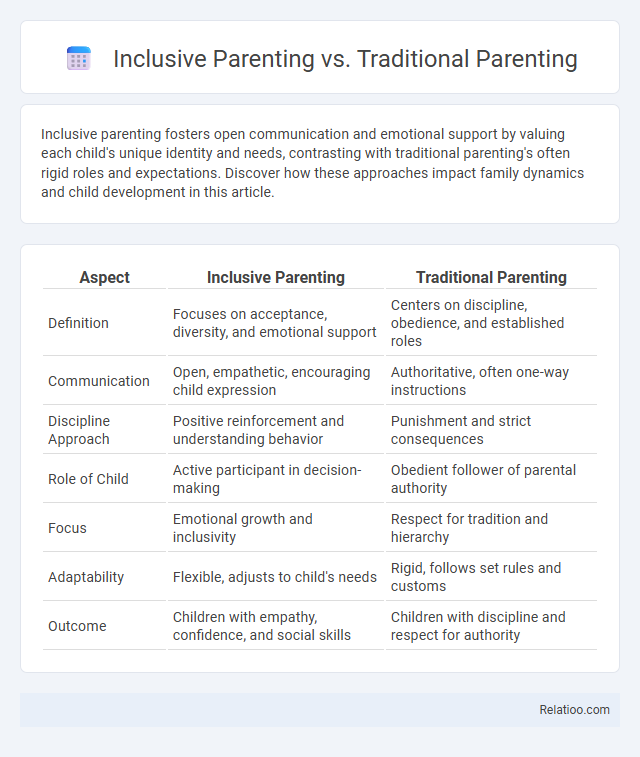Inclusive parenting fosters open communication and emotional support by valuing each child's unique identity and needs, contrasting with traditional parenting's often rigid roles and expectations. Discover how these approaches impact family dynamics and child development in this article.
Table of Comparison
| Aspect | Inclusive Parenting | Traditional Parenting |
|---|---|---|
| Definition | Focuses on acceptance, diversity, and emotional support | Centers on discipline, obedience, and established roles |
| Communication | Open, empathetic, encouraging child expression | Authoritative, often one-way instructions |
| Discipline Approach | Positive reinforcement and understanding behavior | Punishment and strict consequences |
| Role of Child | Active participant in decision-making | Obedient follower of parental authority |
| Focus | Emotional growth and inclusivity | Respect for tradition and hierarchy |
| Adaptability | Flexible, adjusts to child's needs | Rigid, follows set rules and customs |
| Outcome | Children with empathy, confidence, and social skills | Children with discipline and respect for authority |
Understanding Inclusive Parenting
Understanding inclusive parenting involves recognizing and valuing diversity, fostering acceptance, and promoting empathy among children with various backgrounds and abilities. Unlike traditional parenting, which often follows fixed roles and cultural norms, inclusive parenting emphasizes flexibility, open communication, and respect for each child's unique identity and needs. This approach supports holistic development by encouraging inclusivity in education, social interactions, and emotional growth.
Defining Traditional Parenting Approaches
Traditional parenting approaches emphasize structured roles and clear boundaries, often prioritizing obedience, discipline, and respect for authority. These methods typically rely on consistent rules and expectations established by parents, reflecting cultural or generational values. Your understanding of traditional parenting highlights its focus on stability and conformity within the family dynamic.
Core Principles of Inclusive Parenting
Inclusive parenting centers on recognizing and valuing each child's unique identity, fostering empathy, and promoting equal respect regardless of abilities, gender, or background. It contrasts with traditional parenting by emphasizing adaptability, open communication, and active support for diversity within the family unit. Core principles include creating a safe, affirming environment, encouraging self-expression, and advocating for social justice and acceptance in broader societal contexts.
Key Characteristics of Traditional Parenting
Traditional parenting emphasizes clear authority, structured routines, and discipline based on obedience, often relying on rules and consequences to guide behavior. It values respect for elders and adherence to established norms, prioritizing stability and predictability in the family environment. Your understanding of these key characteristics helps distinguish traditional parenting from more flexible and empathetic approaches like inclusive parenting.
Communication Styles: Inclusive vs Traditional
Inclusive parenting emphasizes open, empathetic communication that values your child's feelings and perspectives, fostering mutual respect and active listening. Traditional parenting typically relies on authoritative communication styles with clear directives and expectations, prioritizing obedience and structure. Your choice between these approaches shapes your child's emotional development and the quality of your family interactions.
Discipline Methods: A Comparative Analysis
Inclusive parenting emphasizes positive reinforcement and empathetic communication to foster mutual respect, contrasting with traditional parenting methods often rooted in strict discipline and obedience. Your approach to discipline in inclusive parenting integrates cultural sensitivity and individualized strategies that accommodate diverse learning styles and emotional needs. This comparative analysis highlights the effectiveness of inclusive parenting in promoting emotional intelligence and social development over conventional authoritative tactics.
Fostering Emotional Intelligence in Children
Inclusive parenting emphasizes recognizing and validating children's diverse emotional experiences, fostering emotional intelligence by encouraging empathy, self-awareness, and open communication, unlike traditional parenting which often prioritizes obedience and emotional restraint. Inclusive parenting strategies create a supportive environment where children learn to identify and express their emotions healthily, promoting resilience and social competence. By contrast, the rigid structures in traditional parenting may limit children's emotional development, whereas inclusive approaches adapt to each child's unique needs, enhancing emotional growth and interpersonal skills.
Handling Diversity and Individual Needs
Inclusive parenting emphasizes recognizing and valuing your child's unique identity, fostering acceptance of diverse backgrounds and abilities to support holistic development. Traditional parenting often follows fixed roles and norms, potentially limiting responsiveness to individual differences and diverse needs. Prioritizing inclusive approaches promotes empathy, adaptability, and respect for varied experiences to effectively handle diversity in your family.
Long-term Outcomes: Inclusive vs Traditional Parenting
Inclusive parenting fosters emotional intelligence, resilience, and social adaptability in children, leading to improved long-term mental health and interpersonal relationships. Traditional parenting often emphasizes obedience and structure, which can result in discipline but may limit emotional expression and problem-solving skills over time. Research indicates that inclusive parenting's emphasis on empathy and support correlates with higher academic achievement and better conflict-resolution abilities in adulthood.
Choosing the Right Parenting Style for Your Family
Choosing the right parenting style involves understanding the distinct approaches of Inclusive Parenting, Traditional Parenting, and hybrid methods. Inclusive Parenting fosters emotional intelligence and diversity awareness by encouraging open communication and empathy, while Traditional Parenting emphasizes discipline, structure, and clear boundaries often rooted in cultural norms. Families benefit from blending strategies tailored to their unique values and children's needs, promoting development and harmony.

Infographic: Inclusive Parenting vs Traditional Parenting
 relatioo.com
relatioo.com